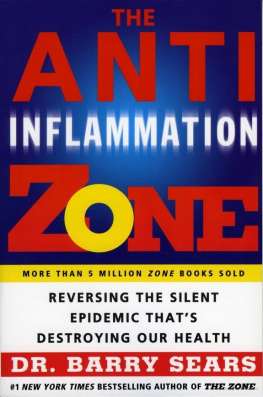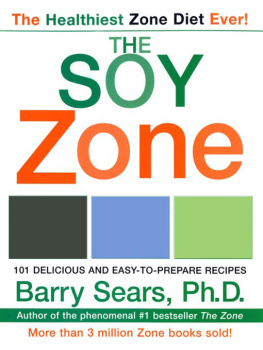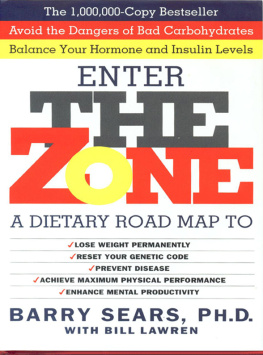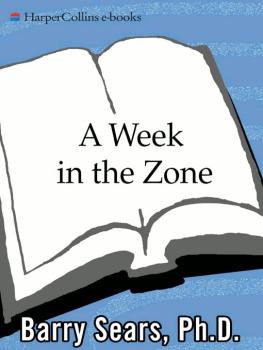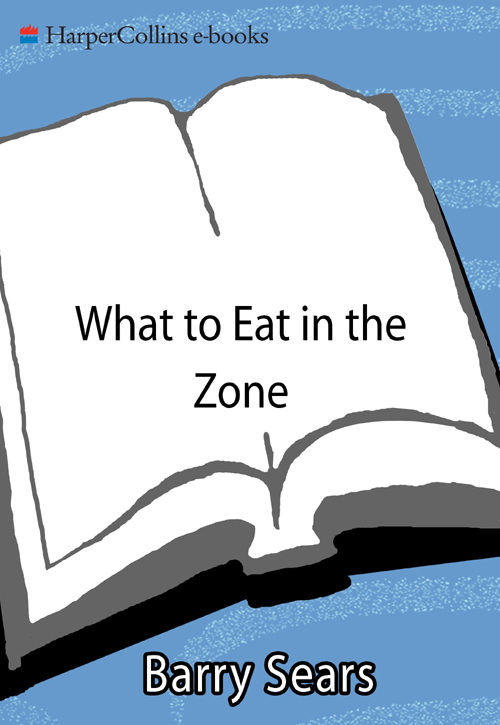DR. BARRY SEARS
WHAT TO EAT
IN THE
Z ONE
THE
QUICK & EASY,
MIX & MATCH COUNTER
FOR STAYING
IN THE ZONE
(Originally published as Zone Food Blocks)

CONTENTS
PART I
Getting Started
What is the Zone? You have probably heard many things about it. Let me first say what the Zone is not. It is not a high-protein diet, and it is not a high-fat diet, and it is not a high-carbohydrate diet. It is, however, about moderation and balance. Specifically, its about hormonal balancekeeping hormonal responses (and in particular, the hormone insulin) generated by the food you eat within a zone: not too high, not too low. If insulin levels are too high, you will accumulate excess stored body fat. If insulin levels are too low, your cells will starve to death. In essence, when you follow the Zone Diet you are treating food as if it were a drug, giving food the same respect that you would give any prescription drug. This is a revolutionary concept, and this is why the Zone is controversial. When viewed through this hormonal prism, food can be your greatest ally or your worst enemy; you just have to know how toplay by the rules that havent changed in 40 million years and are unlikely to change tomorrow.
You need to be in the Zone, because your life depends on it. The Zone is about hormonal thinking and how the food you eat controls very powerful hormones that are often hundreds of times more powerful than prescription drugs. Hormones are the chemical messengers of your body. They direct every one of your bodys vital systems as they can either drive your body toward illness and disease or redirect your body toward health. When they are functioning at their best, they can help your body achieve a state of wellness and optimal performance. This is what the Zone Diet is all about. Once you begin to think about food hormonally, you soon realize just how powerful a drug food actually is. This doesnt mean that food has to taste like a drug, but it does mean that its important to realize that food can have adverse hormonal side effects, such as the overproduction of insulin.
Hormonal thinking is very different than caloric thinking. Caloric thinking can be summarized by this philosophy: if no fat touches my lips, then no fat reaches my hips. This type of thinking has been the nutritional mantra in America for the past 15 years. During this time, fat has been made to be the villain of our society. Yet in that same 15-year period we have actually been eating less fat than ever before and, in the process, have become the fattest people on the face of the earth (1). What went wrong? Maybe fat is not the demon we have been told. This is why more and more scientists are voicing their doubts in prestigious journals like the New England Journal of Medicine in 1997:
Replacement of fat by carbohydrate has not been shown to reduce the risk of coronary disease. (2)
Beneficial effects of high-carbohydrate diets on the risk of cancer or body weight have also not been substantiated. (2)
Or other medical researchers who have stated:
The more insulin-resistant the individual, the greater the likelihood that low-fat, high-carbohydrate diets will increase the risk factors for ischemic heart disease. (3)
How could this be if we have been told that eating a low-fat, high-carbohydrate diet is the key to better health? In essence, these respected scientists are saying the emperor (i.e., the low-fat diet, high-carbohydrate diet) has no clothes. Americans have been sold a pig in a poke for the last 15 years with the expectation that low-fat, high-carbohydrate diets would be the panacea for our health and wellness. The hormonalthinking behind the Zone explains why this hasnt happened. In fact, the general state of health in America is worse now than it was 15 years ago. Fortunately, there is a solution to this health crisis because it can be reversed with the Zone Diet.
If dietary fat alone doesnt make you fat (besides not causing heart disease and cancer), then what does? One answer is excess levels of the hormone insulin. The power of the Zone is that this hormone can be controlled by the diet. The Zone is about keeping insulin in a range or zonenot too high, not too low. Not only can keeping insulin in a tight zone prevent you from gaining weight and help you to lose it, but also maintaining insulin in this same zone produces the following benefits:
- Thinking better
- Performing better
- Looking better
- Living better (and longer)
Who doesnt want to experience these benefits? Lets take them one by one.
Thinking Better
Maintaining peak mental acuity is simply a consequence of maintaining stable blood sugar levels. Blood sugar is the metabolic fuel your brain uses to maintain your mental activity. If blood sugar levels drop, then brain function (and your thinking ability) becomes compromised since your brain is running on empty. This is known as low blood sugar or hypo-glycemia. As an example, think about how you feel three hours after eating a big pasta meal. You can barely keep your eyes open, and you find yourself in a dense mental fog. Thats an example of low blood sugar. Should your blood sugar levels drop even lower, the brain will actually shut down and go into a coma. This commonly occurs with diabetics who inject too much insulin. Before that drastic step happens, most people will reach for some high-carbohydrate snack that will temporarily increase blood sugar levels, but this simply starts this vicious cycle over again.
What controls your blood sugar levels? It is the amount of insulin in the bloodstream. Insulin is a storage hormone. It tells your body to drive incoming macronutrients (protein, carbohydrate, and fat) into their respective sites for storage so that they can be used at some time in the future. Too much insulin, and you drive down the levels of blood sugar by sending it to the liver and muscles for storage. This is great for those organs, but not too good for the brain. When blood sugar levels drop, clear and concise thought becomes more difficult. I dont care howmany Ph.D.'s you have, once low blood sugar sets in, your mental capacity drops like a stone. On the other hand, if you can maintain insulin in the Zone, then you stabilize blood sugar levels, giving you peak mental acuity for four to six hours after your last Zone meal. Thats the good news. The bad news is that in order to maintain your insulin levels in that Zone, you must eat another Zone meal every four to six hours. In essence you are treating food as if it were a drug, to be taken at the right dosage and the right time.
Performing Better
The average American male or female carries more than 100,000 stored calories as fat on their body. This is a remarkable amount of energy. In fact it is equivalent to eating 1,700 pancakes for breakfast. The problem is how to access this stored energy for your daily activities. The answer is to lower elevated insulin levels to get into the Zone. Once your insulin levels are in the Zone, its as if you have a hormonal ATM card that allows you to tap into those 1,700 fat pancakes throughout the day. On the other hand, if you have high levels of insulin, there is no way you can ever access those fat pancakes for energy because elevated insulin blocks the enzyme that is required for their release. And here is another bit of bad news about excess insulin. If you are exercising or doing any physical activity, realize that high levels of insulindecrease oxygen transfer to your muscle cells, thereby building up lactic acid which causes muscle fatigue. So if you want to perform better throughout the day, keep your insulin levels in the Zone.



